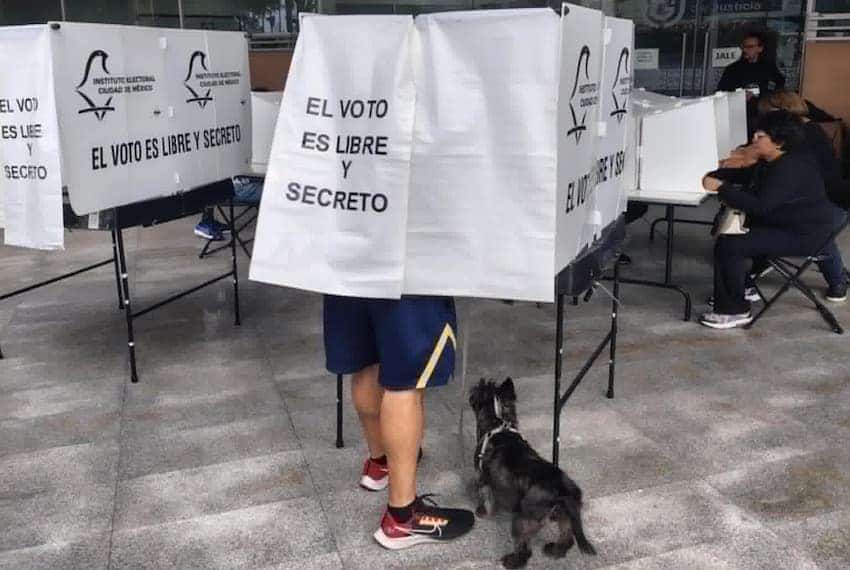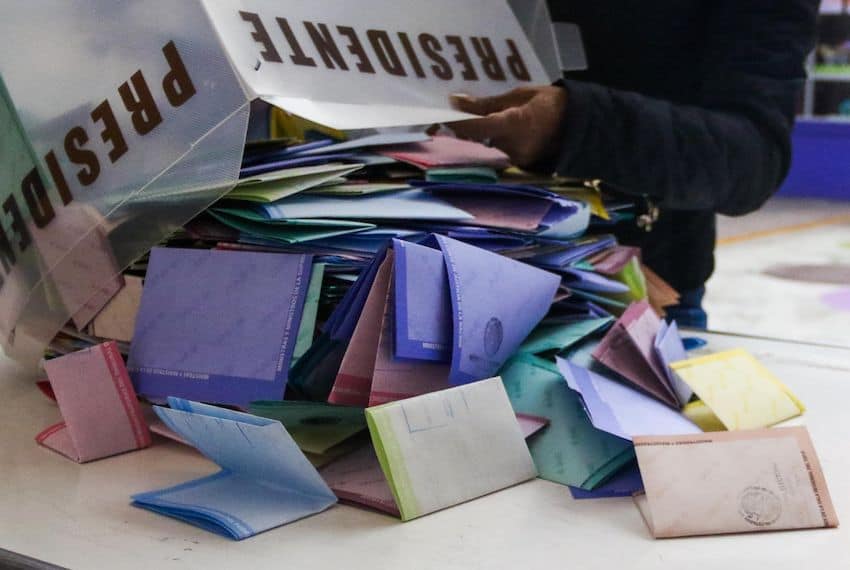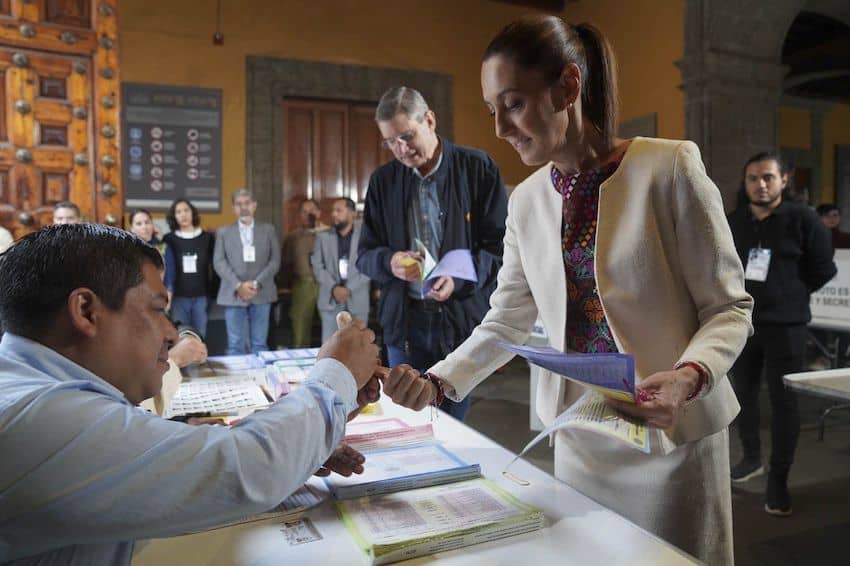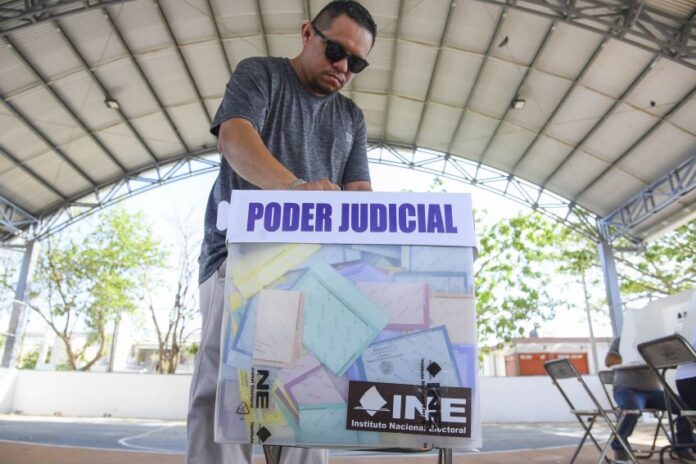Turnout at Mexico’s first-ever judicial elections on Sunday was only around 13% of eligible voters, but President Claudia Sheinbaum nevertheless described the democratic exercise as a great success.
Around 7,700 candidates appeared on ballot papers, presenting a gargantuan and confusing task for voters. All told, citizens were required to elect almost 2,700 judges, including nearly 900 federal ones. Voters in 19 of Mexico’s 32 federal entities voted for local judges in addition to members of the federal judiciary.
Some citizens relied on “cheat sheets” known in Mexico as acordeones when voting in the controversial elections. The counting of votes has commenced, but the final results — including those revealing who Mexico’s nine Supreme Court justices will be — won’t be known until later this week.
The president of the National Electoral Institute (INE), Guadalupe Taddei, announced late on Sunday night that the estimated turnout was between 12.57% and 13.32% of eligible voters. Just under 100 million people appear on Mexico’s electoral roll, meaning that around 13 million citizens voted on Sunday.
Around 20% of all votes were invalid, either due to voters’ mistakes or because they chose to annul their ballots on purpose.
The turnout was the lowest for a federal election in years, but there was no minimum threshold that was required to be met to make the vote binding, as was the case with a 2021 referendum on whether past presidents should be investigated for crimes they might have committed while in office. The polling places observed by Mexico News Daily in Mexico City and San Miguel de Allende on Sunday were not at all busy.
Many Mexicans “expressed a deep sense of apathy” with the elections, “citing disillusionment due to decades of corruption and lack of basic information about the vote,” the Associated Press reported.
One year ago, when Mexicans elected Sheinbaum as president, as well as federal deputies and senators, voter turnout was 61%, or more than four times that recorded on Sunday.

The elections took place due to the approval by Congress last year of a judicial reform put forward by former president Andrés Manuel López Obrador, who was an open critic of Mexico’s judiciary and angered by rulings against some of his flagship policies and projects.
The popular election of judges replaces a system in which merit and experience of aspirants were taken into account. Among the criteria candidates who contested Sunday’s elections were required to meet was to have a law degree and a “good reputation,” but the overall threshold to become a judge was widely seen as considerably lower than in the past. Some candidates allegedly have links to organized crime.
The main official reason for holding the elections was to renew Mexico’s judiciary and thus rid it of ills such as corruption and nepotism. However, critics argued that the staging of the elections was an attempt by the government and ruling Morena party to seize control of the judiciary. They warned that the independence of Mexico’s judiciary would be eroded by the elections, thus removing, or at least weakening, an essential check on executive power.
As evidenced by last year’s election results as well as poll results, Morena is extremely popular in Mexico, and thus judicial candidates seen as allied with or at least sympathetic to the ruling party were predicted to do well.
An exit poll conducted by the newspaper El Financiero at 40 polling places across Mexico found that 54% of voters supported candidates seen as sympathetic to Morena. The same poll found that half of voters found the ballots “simple” and “understandable,” while the other half considered them “complicated” and “confusing.”
Over 1,700 “incidents” were reported on Sunday, including the robbery of ballots and other crimes, but the elections weren’t marred by any events of significant violence. Some polling places opened much later than scheduled for reasons including an absence of voting officials.
The newspaper El Universal reported that “due to the complexity of the exercise, a lot of citizens arrived [at polling places] with a ‘support.’

“People were seen consulting their telephone, others took out sheets of paper with their own notes; many others made use of the acordeones that were distributed en masse,” the newspaper said.
Some of those “cheat sheets” were handed out by “Morena operatives,” The New York Times reported.
In Tultitlán, México state, 37-year-old Jazmín Gutiérrez Ruiz told the Times that her reasons for voting were personal as two of her brothers have been in prison for two years, accused of a homicide “they didn’t do.”
“I want the magistrates and judges to change, and for them to take the time to carefully look at the cases,” said Gutiérrez, an employee of a processed meat company.
“Just like my brothers, there are many people locked up unjustly,” she told the Times.
In addition to the use of “cheat sheets,” there were also reports of acarreo — a practice in which voters are transported to polling places and incentivized to vote for certain candidates.
Sheinbaum: ‘Historic election’ was a ‘complete success’
In a video message posted to social media on Sunday night, Sheinbaum declared that the “historic election” was a “complete success.” ”
“Close to 13 million Mexicans went out to exercise for the first time in history their right to decide who the new Supreme Court justices, magistrates and judges should be,” she said.
“Today millions of Mexicans freely voted for the new guardians of justice. We shouldn’t forget that the current judiciary, who some people defend, has been responsible for favoring members of organized crime” as well as white-collar criminals, Sheinbaum said.
“Half of the judiciary, as stated by its own president [Chief Supreme Court Justice Norma Piña], got their positions due to nepotism, in other words by being siblings, cousins, nieces and nephews or in-laws of a magistrate or justice,” she added.
Sheinbaum also responded to claims that the motivation for holding judicial elections was to seize control of the judiciary.

“As I have said many times, if we wanted to change the judiciary to control it, what sense would holding a universal election have? It would have been better to change the constitution to install justices to suit one’s interests, as was done in the past,” she said.
“Instead of that, we chose the best alternative — that the people decide. Yes, the power in Mexico lies in the people, it no longer lies in the few,” Sheinbaum said.
“Today was a transparent process. The candidates were selected by professional committees of the executive, legislative and judicial powers. The campaigns were austere and the voting was free,” she said.
Sheinbaum asserted that the judicial elections will lead to the establishment of a “true rule of law” in Mexico, “where no one, not even the most powerful, will be above the law.”
“Yes, Mexico is the most democratic country in the world,” she said.
“I say to all Mexicans, let’s have confidence. We live in an extraordinary time. We are a free, sovereign, independent country [that is becoming] fairer and more democratic every day.”
During her eight months in office, Sheinbaum has frequently defended the staging of judicial elections, noting on several occasions that many judges in the United States — albeit not federal ones — are elected by citizens.
According to a Pew Research Center survey conducted earlier this year, a strong majority of Mexicans (66%) approve of the election of judges by popular vote, but that support evidently didn’t translate into a large turnout.
The Pew Research Center said that “approval of Mexico’s judicial change is linked to support for Morena and its alliance partners in last year’s election, the Labor Party (PT) and the Ecologist Green Party of Mexico (PVEM).”
“Among those who support these groups, 76% approve of the [judicial reform] policy, compared with 54% of non-supporters,” the research center said.
The Supreme Court race
The number of Supreme Court justices will decline to nine from 11 once the newly elected justices assume their positions later this year. Five of those justices must be women, according to the approved rules for this election.
At midday Mexico City time on Monday, with over 50% of the vote counted, the five leading female candidates were Lenia Batres, Yasmin Esquivel, Loretta Ortiz, María Rios and Sara Herrerías.
Batres, Esquivel and Ortiz are currently Supreme Court justices, all having been appointed during López Obrador’s 2018-2024 presidency. They are widely regarded as sympathetic to the Morena party and its agenda.
The eight other current justices decided not to contest the elections.
The four leading male candidates at midday were Hugo Aguilar, Giovanni Figueroa, Irving Espinosa and Isaac De Paz González.
With reports from Reforma, Milenio, El Universal, AP, El Financiero and La Jornada
